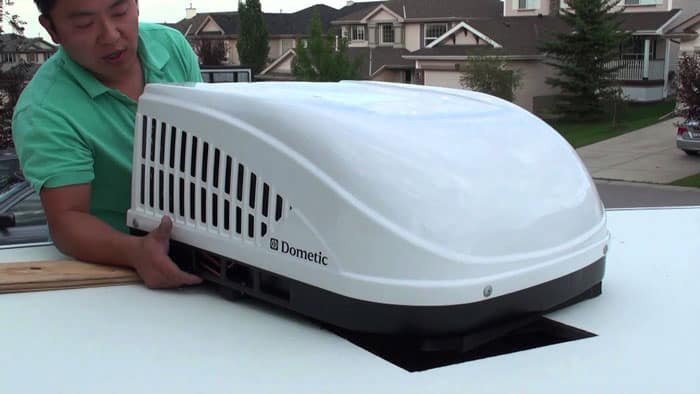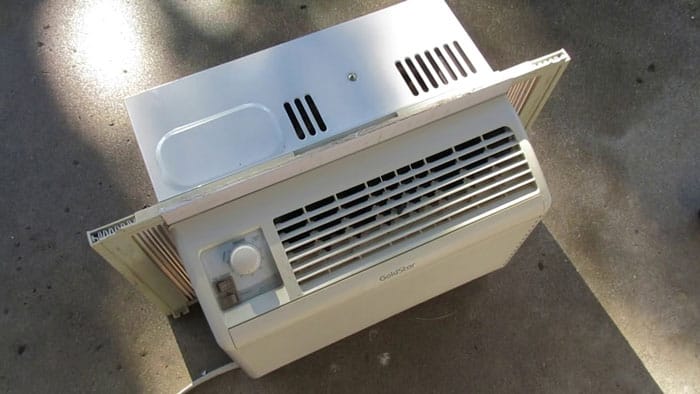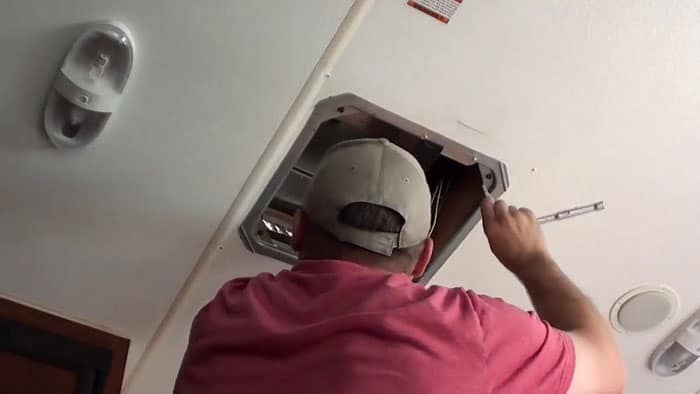RV Air Conditioner Leaks When It Rains: How To Solve?
by Alice Davis
One of the most common problems faced by RV owners is leaking of their air conditioners when it raining.
Browsing through various RV forums, you'll discover that this is one of the most debated topics, indicating how deep a problem it is.
Even worse, water leaking into your RV is a bad idea as it can end up damage the interior of your RV and take you hundreds of bucks back in repairs.
If you're experiencing this problem too and wondering what causes it and how you can fix it, we've got your back.
Below, we'll outline the possible culprits behind this frustration issue and how you can fix it for good.
Contents

How To Fix RV Air Condition Leaks
1. Check the AC mounting bolts
If you notice leaks in your air conditions, one of the first things you should consider checking is the condition of the mounting bolts of your unit.
When installing the best RV ac unit on RV, it's usually sealed to the roof with a sponge rubber gasket, which is compressible and requires maintenance. The gasket is compressed using 3-4 bolts (i.e. the mounting bolts) which you can easily access from the interior of your RV.
In the event of a leak, you should check to ensure that at least half-inch of the gasket isn't tightened down to the roof.

Next, take off the AC grill from the inside of your RV and check the mounting bolts for tightness. These ought to snug and over-tightened. Consider turning each of them once…and to it slowly so that you can feel how hard each turns.
By turning these bolts once, you're simply compressing the gasket to about ½ its original size to help stop the leaks.
WARNING: Contrary to what many people think, bondo or caulking (or simply sealing) around the perimeter of the air conditioner isn't a wise idea.
You'll still need to leave a gap between your RV roof and the base of the AC unit to facilitate smooth draining of condensation you're your unit creates when running.
You seal around the perimeter of your AC and the condensation will have nowhere to escape to but drip into your RV.
2. Worn out rubber gasket
You might also want to check the condition of the rubber gasket. Remember this gasket plays a crucial role in preventing leaks, so if it goes bag, leaks will surely show up.
The older the gasket becomes, the more brittle and hard it becomes, making it unable to seal the opening, thus giving rainwater an easy way into your RV.

luckily, you can replace the old, worn-out gasket with a new one to help get rid of the frustration leaks
The rubber gasket isn't always easily accessible/visible. You'll need to remove your air conditioner from the roof to be able to replace it.
If you doubt your skills or ability to replace the gasket on your own, you can hire an RV air conditioner expert for the job.
3. Could your caulking be the culprit?
If you witness water dripping from your AC air intake, it doesn't always mean that the leak is occurring around your AC mount.
Any water getting under your RV roof will flow along the inner surface and come out through the easiest exist it finds, which is your AC gaping hole/vent. Or it'd run down the inner area of the side walls.
For this reason, you shouldn't always assume your AC is the main culprit.
Do a thorough inspection of your entire roof for leaks. Check areas like around the roof, marker lights, plumbing vents, ladder mounts, satellite dish, antennas, and so on.
We have come across some Rvers openly admitting that they had leaks and though the AC was the problem, only to discover later it was dried up caulking around their TV antenna.
Wait until things dry up, go up the roof and closely inspect all your roof caulking. Don't ignore even a minute crack in the caulking as that's all the water needs to find passage into your RV.
Be on the lookout for any paint chips on your roofing too since they can also lead to leakage issues.
4. Check if your roof has deteriorated
If the part of the roof right below the air conditioner is deteriorated, it could lead to a leak during heavy rains.
One way the roof can deteriorate is sagging and causing water to puddle up around your AV. To see if your roof is suffering a sag, consider pulling a string across it (the roof) from side to side.

Does it have a significant sag?
If yes, then you'll need to raise your AC. You can do this by either installing up to 2 gaskets or you can remove the AC place shimmed between the roof frame and roof itself.
How To Prevent RV Air Conditioner Leaks From Happening Again
Now that you have probably found the underlying problem and fixed, you might be wondering just how long it'd take before the problem arises again.
The good news is that you can prevent the problem from happening by taking certain measures.
One of these measures involves having your AC unit inspected by a professional at least once every year. Probably the best time for the expert to inspect your unit is during non-peak season or before summer arrives. They should be able to inspect various parts of your unit, including the rubber gasket to ensure they're in good condition.
Another measure you should consider taking is taking time to inspect your RV roofing regularly. As we have just mentioned above, you might be surprised to discover the problem isn't actually the AC but a deteriorated roof causing the problem.
Checking your rooftop caulking regularly can also go a long way in preventing these leaks from occurring.
Final Verdict
If you have experienced leaks in your RV air conditioner when it rains, then you know how frustrating this can be. Even worse, the act of rainwater dripping right into your RV and cause costly damages to the interior.
Having outlined the main culprits behind water leaks in your RV air conditioner in this guide, we're hopeful that you'll be able to solve this problem for good and continue living comfortable and stress-free in your RV.
 |
 |
 |
 |
 |
 |
 |
 |

About Alice Davis
Alice is a writer who lives in the City of Long Beach. She has a husband, an exceptionally small chihuahua, and 15-pound Maine Coon. Alice got her bachelor of science in biological science from UC Berkeley. Now, she likes writing about a lot of things; including but not limited to technology reviews, science stuff, and anything food-related.
Leave a Reply
You can get FREE Gifts. Or latest Free phones here.
Disable Ad block to reveal all the info. Once done, hit a button below
 |
 |
 |
 |